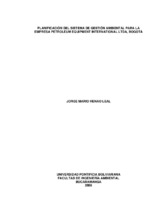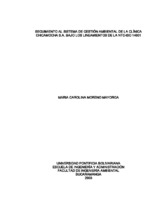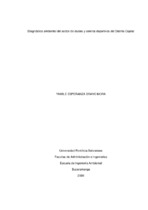| dc.contributor.advisor | Camargo González, Nolva Jackeline | |
| dc.contributor.author | Suarez Jaraba, María Angélica | |
| dc.coverage.spatial | Seccional Bucaramanga. Universidad Pontificia Bolivariana. Escuela de Ingenierías. Facultad de Ingeniería Ambiental | spa |
| dc.coverage.temporal | 2008 | |
| dc.date.accessioned | 2013-02-26T17:40:36Z | |
| dc.date.available | 2013-02-26T17:40:36Z | |
| dc.date.created | 2008-03-10 | |
| dc.date.issued | 2013-02-26 | |
| dc.identifier.uri | http://hdl.handle.net/20.500.11912/61 | |
| dc.description | 191p.:(pdf);il; tablas; gráficas; anexos | spa |
| dc.description.abstract | El constante desarrollo y las diversas actividades de los seres humanos traen como consecuencias efectos positivos y negativos al entorno, en los últimos años se ha evidenciado el constante deterioro ambiental por el uso indiscriminado de materias primas, las emisiones y vertimientos indiscriminados de material contaminante, la producción exagerada de residuos, entre otros, que vuelven necesario pensar en gestionar los diferentes procesos y actividades que se llevan a cabo dentro de las empresas, para poder así mitigar los impactos que se producen a partir de ellas. La Universidad Santo Tomás se une al grupo de interesados por tener un buen desempeño ambiental, es así como teniendo en cuenta los impactos producidos por la institución al ambiente, la necesidad de optimizar sus procesos y servicios, y el deseo de obtener la certificación ISO 14001, se piensa en planificar un Sistema de Gestión ambiental para la Universidad. Es así como se realiza un diágnostico sobre el estado de la institución, luego se identifican y se valoran los impactos ambientales producidos a partir de la metodología escogida y finalmente se diseña la política ambiental y los programas de gestión para cada uno de los impactos significativos encontrados, es decir se crean programas para residuos sólidos, residuos peligrosos, consumo de agua, consumo de energía y finalmente un programa de sensibilización, cumpliendo así con los objetivos propuestos. Finalmente se cumplen cada uno de los objetivos, y se puede concluir adicionalmente que las clínicas odontológicas presentes en la institución son las de mayor impacto ambiental, así como el componente más afectado es el suelo y la ausencia de educación ambiental uno de los mayores problemas en la institución. PALABRAS CLAVES: Sistema, Gestión, ISO | spa |
| dc.description.abstract | The constant development and the various activities of the human beings
bring as a consequence positive and negative effects to the environment.
Through out the past years the environmental deterioration has been
evidenced by the indiscriminate use of natural resources, the emission and
indiscriminate spilling of pollutants, the exaggerated production of residues
among others that make it necessary for us to think in managing the
different processes and activities that are taken into account among the
companies, and by doing so be able to mitigate the impacts that are mitigate
the impacts that are a consequence of them. The university of Santo Tomas
unites with the group of those interested to have a good
environmental fulfillment. Taking into account the impacts produced from the
institution to the environment, the necessity of optimizing its processes and
services, and the desire to obtain the ISO 14001 certification, a system of
environmental management for the university is being planned. It is like this
how a diagnostic is made about the status of the institution, followed by
identifying and giving values to the environmental impacts produced from the
chosen methodology and finally a policy on environmental politics and the
management programs is designed for each one of the significant impacts
that are found. in other words programs for solid residues are created, as
well as dangerous residues, water consumption, energy consumption and
finally a sensitizing program, fulfillment of the proposed objectives. Finally all
the objectives are met, and it can additionally be concluded that the dental
clinics present at the institution are the ones with the highest environmental
impact. the same way the most affected component is the soil and
the absence of environmental education is one of the major problems at the
institution. | |
| dc.language.iso | es | |
| dc.rights | Attribution-NonCommercial-NoDerivatives 4.0 International | * |
| dc.rights.uri | http://creativecommons.org/licenses/by-nc-nd/4.0/ | * |
| dc.subject | Gestión ambiental | spa |
| dc.subject | Normas técnicas - ISO 14001 | spa |
| dc.subject | Gestión ambiental - Universidad Santo Tomas - Bucaramanga | spa |
| dc.subject | Política ambiental | spa |
| dc.subject | Ingeniería ambiental | spa |
| dc.subject | Tesis y disertaciones académicas | spa |
| dc.title | Planificación del sistema de gestión ambiental de la Universidad Santo Tomas de Bucaramanga bajo los lineamientos de la NTC-ISO 14001 | spa |
| dc.type | bacherlorThesis | spa |
| dc.rights.accessRights | openAccess | spa |
| dc.type.hasVersion | publishedVersion | spa |
| dc.identifier.instname | instname:Universidad Pontificia Bolivariana | spa |
| dc.identifier.reponame | reponame:Repositorio Institucional de la Universidad Pontificia Bolivariana | spa |
| dc.identifier.repourl | repourl:https://repository.unab.edu.co/ | |





